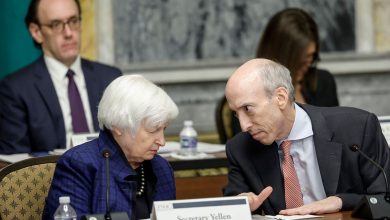Fannie Mae chief economist sees house prices falling in 2023 and 2024 — here are the warning signs that prices will drop in your city

[ad_1]
The real-estate sector is in a quandary.
The housing market was a wild rollercoaster ride that ended with a big fat splat last year, with mortgage rates doubling and demand plummeting.
Home sellers aren’t keen on listing their homes, given that they’ve recently secured an ultra-low mortgage rate. Home buyers, as a result, are struggling to find good options as the number of homes for sale remains low.
So where will the supply come from, to meet buyers’ demand? And what happens if a recession hits? Will home prices fall?
MarketWatch spoke with Doug Duncan, senior vice president and chief economist at Fannie Mae
FNMA,
in a video interview.
Duncan’s team, which is the economic and strategic research group at Fannie Mae, recently published its economic and housing forecast.
MarketWatch: You changed your forecast for housing. Now you expect home prices to fall 6.7% in the next two years, which is more than you previously estimated. What was the reason for that? And what are the signs?
Duncan: You can look and see where [houses] were withdrawn from availability and re-listed at a lower price. That gives you an idea of whether price declines are taking place in that market.
Markets that saw the most rapid appreciation are seeing the most rapid decline. You are probably seeing more declines in the San Jose area than in Indianapolis.
Households that bought recently are the ones that are probably at some risk, although when they bought, they probably got a very low interest rate. So they have to make a decision: Do I give up his 3.5% interest rate because prices fell 20%? Well, if I’m gonna live in the house, does it really matter?
“‘We think we’ll have a mild recession in 2023.’”
MarketWatch: We keep talking about this problem of not having enough homes on the market for sale, and that we aren’t building enough new homes. When will supply improve? Where will these homes come from?
Duncan: It’s gonna come from home builders, until boomers age to a level where they’re forced to give up their home.
One of the things about the boomers that they’ve been very consistent on, is [to say] we intend to age in place. The 75-plus portion of our population has a 78% homeownership rate. There’s a lot of owned homes in that population group.
And of course, they’re going to face mortality, as we all will. So that’s really the biggest driver of things related to mortality that will force them out of those homes that would put that back into supply.
But they’re a healthier group than generations before them. They’re living longer.
So that puts [supply] on the back of builders. But the builders are up against affordability issues from a development perspective because of local zoning issues.
“‘Businesses are going to evaluate remote work.’”
MarketWatch: Are you concerned about this resistance to people returning to work, and the impact on commercial real estate?
Duncan: Businesses are going to evaluate remote work, and they’re going to say, we’re letting workers work remote so that reduces their commuting costs, which is actually a real income gain for them. Because they don’t have to pay for the wear and tear of the car or the subway.
Not all [remote] workers are coming back to that space, and some of that space is going to be reduced in price or in value. And that will show up in defaults and delinquencies, or the sale of a property at a loss.
In the cities with a big central business district like San Francisco or New York City or Chicago, it might be more significant [than] say Indianapolis or Dallas or places where there’s a lot more developable land.
MarketWatch: What happens if the U.S. Federal Reserve raises interest rates to 5.5%? What does that mean for the housing market?
Duncan: The housing sector has a very well established relationship with monetary policy. It’s one of the most interest-rate sensitive sectors, if not the most interest rates in the sector.
We made our first call on the recession [to occur this year]. We looked ahead and we said, if things unfold over the next 9 to 12 months in the following way, we think we’ll have a mild recession in 2023. That looks like it’s a pretty good call. It’s possible it could be a soft landing.
Our base case is something in the neighborhood of a 0.5% to 1% decline in GDP over 2023.
And part of the reason we expect it to be mild is housing because we haven’t solved the supply problem. Millennials are not done buying houses.
The demand-and-supply characteristics are there for a recovery if interest rates come down.
This interview has been edited and condensed for style and clarity.
[ad_2]
Source link



